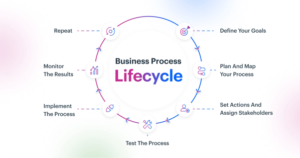Sales marketing automation is a tool that streamlines and automates the sales and marketing processes to improve efficiency and achieve better results. Adopting sales marketing automation can significantly enhance productivity, streamline workflows, and provide valuable insights for targeted marketing campaigns.
In today’s fast-paced business environment, companies are constantly seeking ways to optimize and streamline their sales and marketing efforts to stay ahead of the competition. Sales marketing automation software offers a solution by automating repetitive tasks, such as lead nurturing, email campaigns, and customer follow-ups, allowing sales teams to focus on high-value activities.
By integrating customer relationship management (CRM) data with marketing automation tools, businesses can effectively track and measure the success of their marketing campaigns, identify potential sales opportunities, and nurture leads for higher conversion rates. With the ability to automate processes, personalize customer journeys, and generate insights, sales marketing automation is a game-changer for businesses looking to scale their sales and marketing efforts efficiently. By leveraging this technology, companies can streamline their operations, target the right audience, and drive revenue growth.

Credit: www.facebook.com
Benefits Of Sales Marketing Automation
The implementation of a Sales Marketing Automation system offers numerous benefits to businesses. Here, we will discuss the key advantages that Sales Marketing Automation brings to your company, including improved efficiency, enhanced lead management, streamlined communication, and data-driven decision making.
Improved Efficiency
Sales Marketing Automation significantly improves the overall efficiency of your sales and marketing teams. By automating repetitive and time-consuming tasks, such as data entry, report generation, and lead nurturing, your team can focus on more strategic and high-value activities.
This automation technology eliminates the need for manual data entry, reducing the chances of errors and ensuring accurate data management. With streamlined workflows and automated processes, your team can handle larger volumes of leads and customers without the need for additional resources or manpower. Improved efficiency ultimately leads to increased productivity and better utilization of your team’s time and skills.
Enhanced Lead Management
Proper lead management is crucial for converting potential customers into loyal clients. Sales Marketing Automation provides a comprehensive solution for managing and nurturing leads effectively.
With automated lead scoring and qualification, your sales team can prioritize their efforts on leads that are most likely to convert. The system automatically tracks customer interactions, monitors their engagement levels, and assigns scores based on predefined criteria. This enables your team to focus on leads that show the highest potential, increasing the chances of closing deals and boosting revenue.
In addition, integrating your Sales Marketing Automation with the Customer Relationship Management (CRM) system allows easy access to customer data, enabling your team to tailor their approach and engage with potential buyers more effectively.
Streamlined Communication
Smooth and timely communication is key to building strong relationships with your prospects and customers. Sales Marketing Automation facilitates streamlined communication through various channels, ensuring consistent and targeted messaging.
By automating personalized email and SMS campaigns, you can send the right message at the right time, keeping your audience engaged and informed. Automated nurturing sequences allow you to deliver relevant content based on specific customer interactions, further strengthening your relationship with them.
Moreover, Sales Marketing Automation provides a centralized platform for collaboration and communication among your sales and marketing teams. This eliminates the need for multiple tools and systems, ensuring everyone is on the same page and collaborating efficiently towards common business goals.
Data-driven Decision Making
Data is the lifeblood of every successful sales and marketing strategy. Sales Marketing Automation empowers your business with valuable insights and analytics, enabling data-driven decision making.
By tracking and analyzing customer behavior, campaign performance, and sales metrics, you gain a comprehensive understanding of what works and what doesn’t. This allows you to optimize your marketing efforts, identify areas for improvement, and make informed strategic decisions to drive business growth.
With advanced reporting and real-time analytics, you can monitor the entire customer lifecycle, measure the effectiveness of your campaigns, and identify trends or patterns that could lead to improved conversions and revenue.

Credit: www.youtube.com
Implementing Sales Marketing Automation
Implementing sales marketing automation can be a game-changer for businesses. It streamlines processes, saves time, and maximizes efficiency. However, before diving into the world of automation, businesses need to go through a careful implementation process. In this blog post, we will discuss the key steps to successfully implement sales marketing automation.
Assessing Your Needs
Prior to implementing any sales marketing automation software, it is crucial to assess your needs. Determine the specific pain points and challenges that you want to address with automation. By understanding your requirements, you can select the right software that aligns with your goals. Some areas to consider can include:
- Sales lead management
- Email marketing campaigns
- Customer relationship management
- Performance analytics and reporting
By evaluating your needs, you can prioritize the features and functionalities that are most important for your business. This will help in selecting a software that offers the right solutions.
Choosing The Right Software
When it comes to selecting sales marketing automation software, there are numerous options available in the market. However, not all software will be suitable for your business. It is important to carefully evaluate and choose the one that best fits your needs. Consider the following factors while making your decision:
- Budget: Determine the amount you are willing to invest in automation software.
- User Interface: Ensure that the software has a user-friendly interface for easy navigation.
- Integration: Check if the software can seamlessly integrate with your existing systems and tools.
- Scalability: Consider the future growth of your business and select software that can scale accordingly.
- Support: Look for a software provider that offers reliable customer support.
By assessing each of these factors, you can choose the right software that meets your requirements within your budget.
Integration With Existing Systems
Successful implementation of sales marketing automation requires seamless integration with your existing systems. It is important to ensure that the automation software can integrate smoothly with your CRM, email marketing tools, and other relevant systems. This enables data flow and synchronization, eliminating the need for manual data entry and reducing errors.
Integration offers several benefits:
| Benefits of Integration |
|---|
| Enhanced data accuracy and consistency. |
| Streamlined workflows and processes. |
| Efficient data exchange between systems. |
| Improved decision-making with access to real-time data. |
| Increased productivity with automated tasks and notifications. |
By integrating sales marketing automation with your existing systems, you create an interconnected ecosystem that optimizes your sales and marketing processes.
Best Practices For Successful Sales Marketing Automation
Sales marketing automation is crucial for streamlining processes and boosting efficiency. Best practices include personalized content, timely follow-ups, and utilizing data analytics for targeted campaigns. Implementing these strategies can enhance lead generation and customer engagement, ultimately driving sales growth.
Best Practices for Successful Sales Marketing Automation Aligning Sales and Marketing Teams In order to fully leverage the power of sales marketing automation, it is essential to align your sales and marketing teams. This involves fostering open communication, collaboration, and shared goals between the two departments. By doing so, you can ensure that both teams have a clear understanding of the target audience, messaging, and overall sales objectives. They can work together to create compelling content, identify qualified leads, and maximize conversion rates. Segmenting and Personalization One of the key benefits of sales marketing automation is the ability to segment your audience and deliver personalized messaging. By dividing your contacts into specific subgroups based on demographics, behavior, or other relevant factors, you can tailor your marketing efforts to their specific needs and preferences. Personalization has been proven to enhance customer engagement, increase response rates, and ultimately drive more conversions. Regularly Analyzing and Optimizing Continuous improvement is crucial when it comes to sales marketing automation. By regularly analyzing the performance of your campaigns, you can identify areas that need improvement and make data-driven decisions to optimize your efforts. This includes tracking key metrics such as open rates, click-through rates, conversion rates, and revenue generated. Through thorough analysis and optimization, you can fine-tune your automation strategy to achieve the best possible results. Continuous Training and Adoption Sales marketing automation technology evolves rapidly, and it is important for your teams to keep up with the latest advancements. Continuous training ensures that your employees are equipped with the necessary skills and knowledge to effectively utilize the automation tools at their disposal. By encouraging adoption and providing ongoing support and resources, you can ensure that your teams are able to leverage the full potential of sales marketing automation and stay ahead of the competition. Remember, successful sales marketing automation is not just about implementing the latest technology—it’s about aligning your teams, personalizing your messaging, continuously analyzing and optimizing, and investing in continuous training and adoption. By following these best practices, you can unlock the full potential of sales marketing automation and drive meaningful results for your business.
| Best Practices for Successful Sales Marketing Automation |
|---|
Aligning Sales And Marketing Teams |
|
Segmenting And Personalization |
|
Regularly Analyzing And Optimizing |
|
Continuous Training And Adoption |
|

Credit: www.youtube.com
Future Trends In Sales Marketing Automation
As technology continues to rapidly evolve, so does the field of sales marketing automation. In order to stay ahead of the competition and ensure success in today’s digital landscape, businesses must keep up with the latest trends in this field. The future of sales marketing automation lies in harnessing the power of artificial intelligence and machine learning, creating personalized customer journeys, and leveraging account-based marketing. Additionally, the integration of sales marketing automation with the Internet of Things (IoT) is poised to revolutionize the way businesses connect with their customers.
Artificial Intelligence And Machine Learning
Artificial intelligence (AI) and machine learning are no longer buzzwords, but essential components of effective sales marketing automation strategies. By leveraging AI-powered algorithms and machine learning models, businesses can analyze vast amounts of data, gain valuable insights, and automate repetitive tasks. This empowers sales teams to focus on building relationships with customers and closing deals, rather than getting bogged down by administrative tasks.
Personalized Customer Journeys
Today’s customers expect personalized experiences throughout their entire journey with a brand. Sales marketing automation allows businesses to create tailored customer journeys based on individual preferences, behavior, and interests. By leveraging data collected from various touchpoints, businesses can deliver targeted content, offers, and recommendations that resonate with customers, increasing engagement and conversion rates.
Account-based Marketing
Account-based marketing (ABM) takes a highly targeted approach by focusing on specific accounts or individuals within those accounts. Sales marketing automation platforms enable businesses to identify key accounts, track engagement, and deliver personalized experiences to decision-makers. By aligning sales and marketing efforts, businesses can drive higher ROI, improve customer retention, and create long-term partnerships.
Integration With Iot
The integration of sales marketing automation with the Internet of Things (IoT) presents an exciting opportunity for businesses to deepen their understanding of customer behavior and preferences. IoT-enabled devices, such as connected wearables and smart home assistants, generate valuable data that can be captured and used to deliver more targeted and timely marketing messages. This integration ensures that businesses are able to connect with customers across multiple touchpoints, creating a seamless and personalized experience.
Frequently Asked Questions On Sales Marketing Automation
What Are The Benefits Of Sales Marketing Automation?
Sales marketing automation streamlines processes, increases efficiency, improves customer targeting, and boosts sales productivity. By automating repetitive tasks, businesses can save time and resources while enhancing lead nurturing and customer engagement.
How Does Sales Marketing Automation Impact Roi?
Sales marketing automation helps businesses achieve higher ROI by reducing manual errors, improving lead management, and enabling personalized customer interactions. It provides valuable insights and analytics to optimize marketing strategies and maximize revenue generation.
What Key Features Should I Look For In A Sales Marketing Automation Platform?
When selecting a sales marketing automation platform, it’s essential to consider features such as lead scoring, CRM integration, email marketing automation, analytics/reporting, workflow automation, and customizable dashboards. These elements can enhance productivity and drive better results for your business.
Conclusion
Sales marketing automation is a game-changer for businesses, streamlining processes, boosting productivity, and driving revenue growth. By leveraging technology and data-driven strategies, companies can optimize their marketing campaigns, nurture leads, and achieve better customer engagement. With the right tools and a well-planned automation strategy, businesses can gain a competitive edge in today’s fast-paced digital landscape.
So, it’s time to embrace sales marketing automation and unlock its full potential for your business success. Start automating today!




